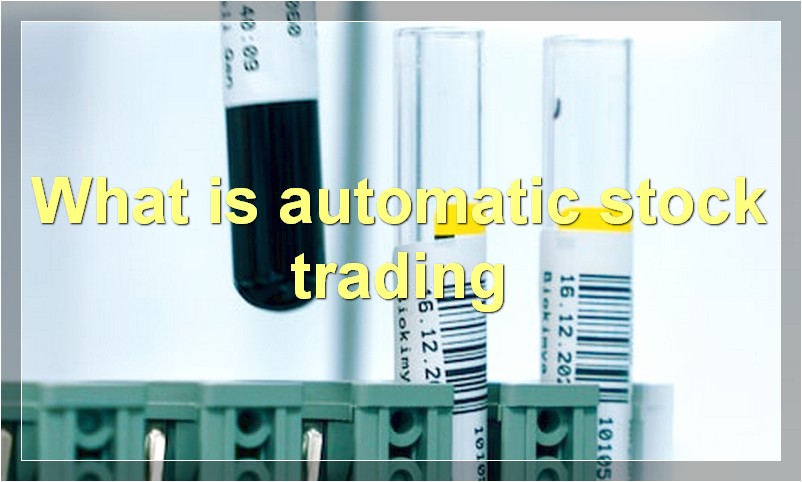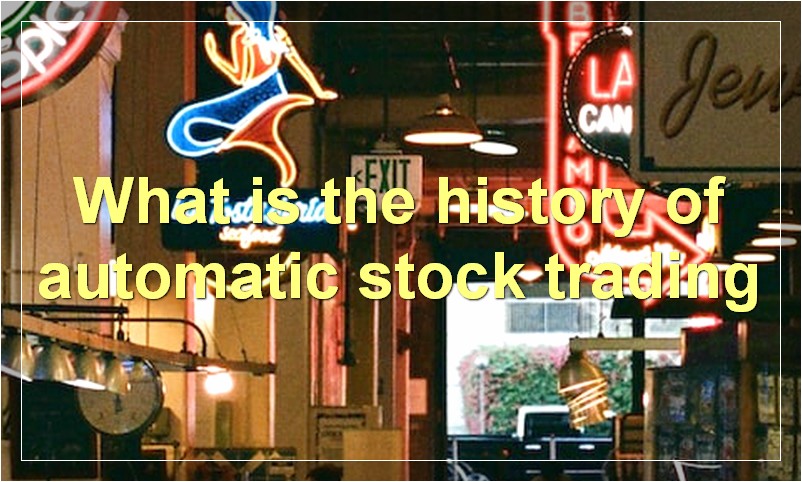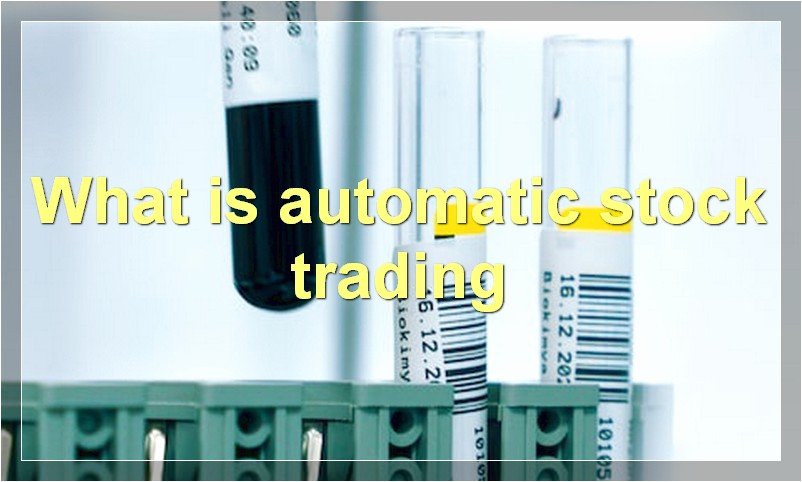The stock market is a complex and volatile beast, often leaving investors feeling lost and confused. Automatic stock trading takes the guesswork out of investing, but is it really the best way to go? This article will explore the benefits and risks of automatic stock trading, helping you to make an informed decision about whether it’s right for you.
What is automatic stock trading

Automatic stock trading is a form of investing that uses computer algorithms to automatically buy and sell stocks. This type of trading can be beneficial for investors because it can help to take the emotion out of decision making, and it can also help to execute trades quickly and efficiently.
How does automatic stock trading work
In automatic stock trading, a computer program is used to make decisions about buying and selling stocks. The program is based on a set of rules that are programmed into it. These rules may be based on technical analysis, or they may be based on the traders own personal preferences. The program then executes the trades automatically.
There are several advantages to using automatic stock trading. One is that it can take emotion out of the equation. When a human trader is making decisions, they may be influenced by their emotions, which can lead to bad decisions. A computer program is not subject to these emotions and can make decisions based solely on the data.
Another advantage is that it can help to diversify a portfolio. A human trader may only trade a few stocks, but a computer program can trade many more. This can help to reduce risk by spreading out investments across a larger number of stocks.
There are some disadvantages to automatic stock trading as well. One is that it can be difficult to change the rules of the program once it is up and running. If the market conditions change, it may be hard to make the program adapt. Another disadvantage is that if there are errors in the program, it can lead to large losses.
What are the benefits of automatic stock trading
There are many benefits of automatic stock trading. Perhaps the most obvious benefit is that it can save you a lot of time. If you’re manually trading stocks, you have to constantly be monitoring the markets, doing research, and making decisions. This can be extremely time-consuming. With automatic stock trading, you can set your parameters and let the software do the work for you.
Another benefit of automatic stock trading is that it can help you to stay disciplined. When you’re manually trading stocks, it’s easy to get caught up in the emotion of the moment and make impulsive decisions. This can lead to chasing losses, over-trading, and other bad habits. Automatic stock trading takes the emotion out of the equation by following pre-determined rules. This can help you to make more rational decisions and avoid costly mistakes.
Finally, automatic stock trading can help to take some of the stress out of investing. If you’re constantly worrying about your stocks, it can be difficult to enjoy your life. By automating your stock trades, you can free up your time and energy for other things.
What are the risks of automatic stock trading
There are a number of risks associated with automatic stock trading, including the potential for errors in the execution of trades, the potential for fraud, and the potential for market manipulation. Additionally, automated stock trading may not be suitable for all investors, as it may not allow for sufficient flexibility to take advantage of market opportunities or to manage risk effectively.
What is the history of automatic stock trading

For many years, the stock market has been one of the most popular investment opportunities. The ability to make money by buying and selling stocks has made it a popular choice for those looking to make a quick buck. However, the stock market is not without its risks. One of the biggest risks is that of human error.
The history of automatic stock trading can be traced back to the 1970s when program trading was first introduced. Program trading is the use of computer programs to trade stocks automatically. This type of trading was designed to take advantage of small price differences in different markets.
The first program trading system was created by a man named Richard Dennis. Dennis believed that it was possible to make money by trading stocks using only a computer program. He put his theory to the test by creating a program that would buy and sell stocks automatically.
Dennis’ program was successful and he made a lot of money. This inspired other traders to create their own program trading systems. These systems became very popular and were used by many different investors.
Today, there are many different types of automatic stock trading systems available. Some are designed for long-term investing while others are designed for short-term gains. No matter what your goals are, there is an automatic stock trading system out there that can help you reach them.
Who developed automatic stock trading
In the late 1800s, a French engineer named Henri Fayol developed a system of automatic stock trading. This system allowed for the buying and selling of stocks without the need for a human broker. The system was based on a simple set of rules that could be programmed into a machine.
Fayol’s system was successful for a time, but it eventually fell out of favor with investors. In the early 1900s, another engineer named Charles Dow developed a more sophisticated system of automatic stock trading. This system, called the Dow Jones Industrial Average, is still in use today.
How has automatic stock trading evolved
In the past, people would have to manually place orders to buy or sell stocks. This process is now done automatically by computers. This has led to a more efficient market, as orders are placed faster and with greater accuracy.
One downside of automatic stock trading is that it can lead to more volatile markets. This is because computers can make decisions faster than humans, and they are not subject to the same emotions.
Overall, automatic stock trading has made the market more efficient and easier to trade in. However, it has also made the market more volatile.
What is the future of automatic stock trading
The future of automatic stock trading is shrouded in mystery. Some experts believe that it will continue to grow in popularity, while others believe that it will eventually be replaced by more traditional methods of stock trading. No one can say for sure what the future holds, but one thing is certain: automatic stock trading has revolutionized the way that many people trade stocks.
What are some companies that offer automatic stock trading services
There are many companies that offer automatic stock trading services. Some of the more popular ones are Robinhood, Acorns, and Stash. These companies allow you to set up an account and link it to your bank account. Then you can choose what stocks you want to invest in and the company will automatically buy and sell them for you.

